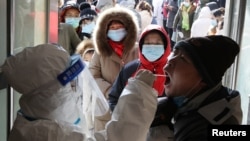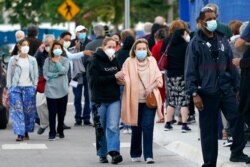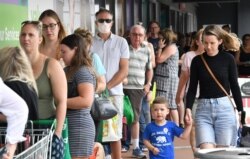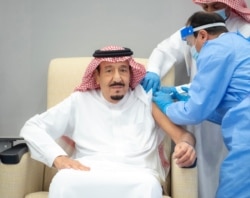The initial round of mass testing for the coronavirus has been completed in Shijiazhuang, a city of 11 million that was locked down Wednesday after 39 new cases of the virus surfaced, the city’s mayor said Saturday.
Mayor Ma Yujun said at a news conference that a second round of testing would begin soon in the capital of Hebei province, which was sealed off as travel restrictions were imposed in the rest of the region of 76 million people that encircles Beijing.
On Tuesday, Hebei authorities put the province into "wartime mode," enabling authorities to launch a collaborative campaign involving contact tracing and distribution of medical supplies.
The aggressive approach taken by Chinese authorities is being adopted in other parts of the Asia-Pacific region, in sharp contrast to the more deliberate virus containment efforts under way in the U.S. and Europe.
The United States had more cases Saturday than anyplace else, with more than 22 million of the world’s nearly 90 million infections, according to Johns Hopkins University. India was second with more than 10.4 million cases.
The U.S. reported more than 300,000 new COVID cases Friday, close to its January 2 record.
Vaccine release
With the virus surging in some U.S. states, President-elect Joe Biden said he backed the rapid release of COVID vaccines so that whoever wants it will have access to it. Biden’s office said Friday that it would limit the Trump administration’s practice of increasing inventories of vaccine doses to guarantee that people get the booster shot several weeks after the first inoculation.
Infectious-disease expert Anthony Fauci said earlier this week he was hopeful that when Biden is in office, the U.S. will be able to deliver to the public “1 million vaccinations per day, as the president-elect has mentioned.”
A surprising development, however, has emerged in some implausible locations. The Associated Press reports that some health care workers in hospitals and nursing homes are hesitant about being vaccinated. The AP said its investigation uncovered that in some places as much as 80% of the medical staff has declined the vaccinations.
One doctor told the wire service he wanted to wait a few months to “see what the data show.” He said, “I don’t think anyone wants to be a guinea pig.”
A nurse said she was delaying her vaccination because of the vaccine’s “unknown side effects.”
Some medical personnel, however, are reversing their hesitancy. One medical director told AP that “the biggest thing that helped us to gain confidence in our staff was watching other staff members get vaccinated, be OK, walk out of the room, you know, not grow a third ear, and so that really is like an avalanche,” causing staff members to rethink how they view the inoculations.
Using caution
Some countries are also taking a wait-and-see attitude toward vaccines. The British newspaper The Guardian said Australia, New Zealand, Taiwan, Japan and South Korea were among the countries that had decided to see what is happening in the rest of the world with the inoculations.
Jennifer Martin, an Australian physician who is also on the advisory committee of the sole purchaser for pharmaceuticals in New Zealand, said, “Why would you put people at risk when if you wait a bit longer, you can get more information?”
The head of the World Health Organization, Tedros Adhanom Ghebreyesus, Friday urged the manufacturers of COVID-19 vaccines and the wealthier countries to make them available to poorer countries. He said most of the 42 countries rolling out coronavirus vaccines were high-income nations and a few were middle-income countries.
Iran’s supreme leader, Ayatollah Ali Khamenei, has banned imports of COVID-19 vaccines from America’s Pfizer-BioNTech and Britain’s AstraZeneca, citing a mistrust of Western countries.
“I really do not trust them,” Khamenei said Friday in a televised speech. “Sometimes they seek to try out their vaccines on other nations to see if it works or not,” he said. “I am not optimistic [about] France, either.”
Khamenei said he continued to allow the import of vaccines from other "safe" places and still supported his country’s efforts to produce its own vaccine.
Iran began human trials with its vaccines in December and officials hope they will be available in the country in a few months.
Saudi king vaccinated
In Saudi Arabia, the country’s 82-year-old monarch, King Salman, received a coronavirus vaccination, according to video published by state media Friday. Saudi health officials recorded just 97 new cases of the virus Friday and four deaths as infections in the country continued to decline.
Israel’s health ministry said Saturday that four people had tested positive for the novel coronavirus strain first detected in South Africa. The British variant had already been reported in the country.
Health experts say both strains are potentially more infectious than other variants.
Persistently high caseloads forced Israel to tighten lockdown measures Friday after imposing a nationwide lockdown last month.
Under Israel’s national vaccination program, 70% of its population older than 60 received initial vaccinations. Prime Minister Benjamin Netanyahu said Thursday that he'd reached an agreement with Pfizer-BioNTech to provide enough vaccine to have all citizens older than 16 be vaccinated by the end of March.
India said Saturday that it had recorded 18,222 new COVID cases in the past 24 hours. The health ministry also said it had recorded 90 cases of the British variant of the virus.








